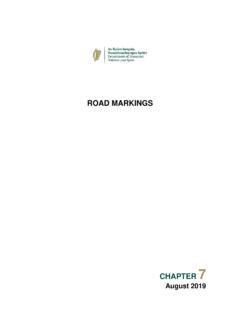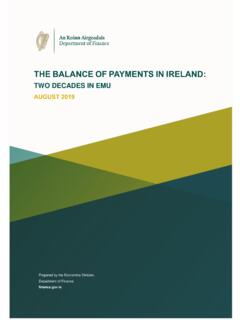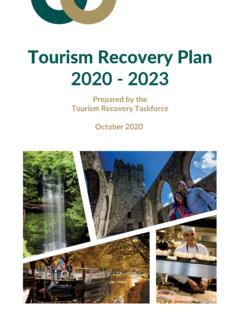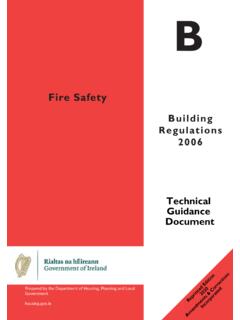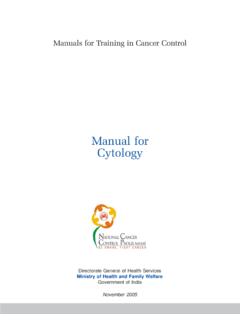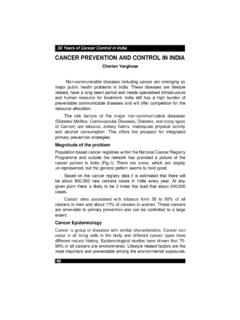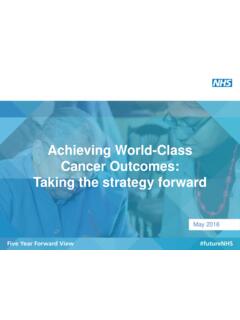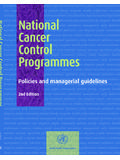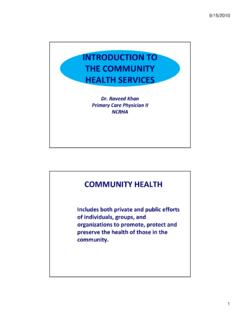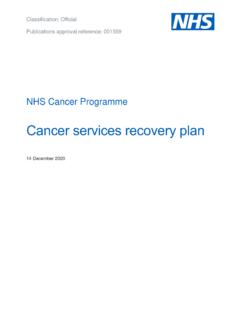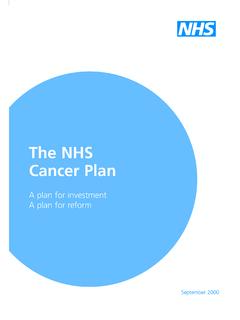Transcription of NATIONAL CANCER STRATEGY - assets.gov.ie
1 NATIONAL CANCERSTRATEGY2017 - 2026 Photographs provided by Anthony Edwards, Brendan McClean, Dave Meehan, Donal Murphy and Andres byElement Design. NATIONAL CANCER STRATEGY 2017-20261 MINISTER S FOREWORDThis NATIONAL CANCER STRATEGY is all about people. It is about preventing CANCER across our population, diagnosing CANCER early, providing optimal care to patients and maximising their quality of life. Ireland has made significant progress under the previous STRATEGY . We now aim to take on the challenge of making further strides in CANCER control such that survival rates can reach the top quartile of European countries by the end of the STRATEGY period. CANCER prevention is a cornerstone of this STRATEGY as it offers the most cost-effective, long-term approach for CANCER control . CANCER prevention sits fully into the Healthy Ireland approach in my Department.
2 As in other health matters, particular focus will be put on achieving integration across primary, acute and social care services. A key element in ensuring this is the strengthened governance and oversight role envisaged for the NATIONAL CANCER control programme in providing leadership across the continuum of care. The primary aim for all CANCER services is to provide evidence-based care that is effective, safe, of high quality and patient-centred, supported by NATIONAL standards and clinical guidelines. Annual reports on the implementation of this STRATEGY , together with the broader healthcare quality reporting system, will help in this regard, as well as keeping the public informed on progress. With CANCER survivorship numbers increasing significantly, optimising peoples quality of life is a particular focus of patients.
3 This emphasis on quality of life will be central in the implementation of the STRATEGY . The CANCER Patient Forum made a huge contribution that impacted on all involved and resulted in a better STRATEGY . I thank the Forum members for their most willing engagement and I am committed to the continued involvement of patients in the implementation would also like to acknowledge the contribution of the CANCER STRATEGY Steering Group, chaired most effectively by Professor John Kennedy. They worked enthusiastically, aided by inputs from many invited participants at their meetings, to finalise recommendations for a comprehensive fully endorse this STRATEGY and I was delighted to present it to Government for approval. Now it s all about Harris, for HealthNATIONAL CANCER STRATEGY 2017-20262 CHAIRMAN S FOREWORDThe first CANCER STRATEGY , entitled CANCER Services in Ireland: A NATIONAL STRATEGY , was published in 1996.
4 Under the leadership of the late Professor James Fennelly, the CANCER STRATEGY Group identified the inferior Irish mortality figures for CANCER compared to the European average and proposed a series of measures to reduce the death rate from CANCER in the under 65 age group by 15 per cent in the ten year period to 2005. The extensive appointment of a broad range of CANCER specialists, and the reorganisation of services, under the STRATEGY resulted in this goal being achieved well before the target date. The implementation of the recommendations in the Hollywood report, published in 2003, also had a hugely significant impact on the delivery of radiation therapy in Ireland. Informed by the work of the NATIONAL CANCER Forum chaired by Professor Paul Redmond, the second NATIONAL CANCER STRATEGY , A STRATEGY for CANCER control in Ireland, was published in 2006.
5 This STRATEGY embraced the concept of CANCER control that had emerged internationally and it included recommendations in relation to organisation, governance, quality assurance and accreditation across the continuum of CANCER care. The establishment of the NATIONAL CANCER control programme (NCCP) to formulate a whole population, integrated and cohesive approach to CANCER followed in 2007. In parallel with the establishment of the NCCP, we have seen the embedding of CANCER screening programmes in the healthcare system and the very significant improvements in delivery of radiation therapy. All of these developments have delivered continuing improvements in outcomes for Irish patients with are now faced with a different set of opportunities and challenges. Improving therapies have gratifyingly resulted in a greatly increased number of people who have survived CANCER .
6 Breathtaking advances in basic and translational science have resulted in a proliferation of novel diagnostics and therapeutics and this trend will continue. Such advances present great opportunities, but their integration into CANCER care will present organisational and financial challenges. At the same time, our population is aging rapidly, driving a relentless increase in CANCER incidence, and challenging clinicians to treat patients who have complex medical needs. Meanwhile, much of our NATIONAL CANCER STRATEGY 2017-20263infrastructure is not up to international standards, at capacity and struggling to cope with the demands placed on this STRATEGY we map a route for CANCER care over the next decade. However, given the accelerating rate of progress in the CANCER field, the increasing recognition of the degree of complexity of CANCER cases and the ten year STRATEGY period, issues will be addressed incrementally as short, medium and long-term goals.
7 For example, immediate needs might involve addressing deficiencies in specialist CANCER nursing and strengthening the role of the NCCP, while the development of comprehensive electronic patient records might be seen as a medium-term issue. Also, the centralisation of CANCER surgical services, commenced several years ago, must be completed as expeditiously as possible. However, it is more difficult to define the challenges which will arise in the later years of the STRATEGY period and so is proposed that the recommendations of the STRATEGY will be reviewed towards the end of 2021 to ensure that our aims and direction are appropriate to deliver optimum outcomes for the words of Dr Christopher Wild, Director of the International Agency for Research on CANCER (IARC), we cannot treat our way out of the CANCER problem.
8 It is essential that we act now to reduce the incidence of CANCER in the medium to long term. Aggressive programmes of public education, risk reduction, prevention and early detection must be promoted by the Department of Health and the NCCP, with extensive coordination across all stakeholders, notably primary care and the voluntary sector. We must also continually strive for earlier diagnosis of CANCER in patients. Only if we are successful in achieving these goals will we be able to minimise the extent of the CANCER problem in the coming is the case across the STRATEGY , I strongly believe that the most strenuous efforts must be made to target more deprived populations in CANCER prevention and early diagnosis interventions. There is incontrovertible evidence of the enormous impact of socioeconomic status and deprivation on death rates from some cancers in Ireland.
9 The causes are multifactorial, ranging from high smoking levels, and poor diet to inadequate access to timely diagnostic services. Apart from being the just approach, this represents the most effective way to ensure future optimal value for money for the health service. Finally, I would like to acknowledge the extensive work undertaken by the members of the CANCER STRATEGY Steering Group and the CANCER Patient Forum in developing this report. In discharging the remit given to them by the Minister for Health, they were ably supported by the Department of Health team, comprising Michael Conroy, Keith Comiskey, Clodagh Murphy and Stephen McGettrick from the CANCER , Blood & Organs Policy M. John KennedyChairmanNATIONAL CANCER STRATEGY 2017-20264 MINISTER S FOREWORD 1 CHAIRMAN S FOREWORD 2 EXECUTIVE SUMMARY 6 SECTION A THE NEED FOR THIS STRATEGY 11 INTRODUCTION Developments in CANCER Services Development of this STRATEGY 14 CHAPTER 2 CANCER IN IRELAND Introduction CANCER Types Trends in CANCER Incidence Projections of CANCER Incidence Age at Diagnosis of CANCER CANCER Stage at Diagnosis CANCER Survival International Comparisons 23 CHAPTER 3 STRATEGIC CONTEXT Introduction Evaluation of A STRATEGY for CANCER control in Ireland.
10 2006 Public Consultation 2015 International Context for CANCER control A Strategic Approach to CANCER control in Other Jurisdictions Priorities for the Next Ten Years 34 CHAPTER 4 VISION Introduction Goal: Reduce the CANCER Burden Goal: Provide Optimal Care Goal: Maximise Patient Involvement and the Quality of Life of Those Living With and Beyond CANCER Goal: Enable and Assure Change 40 SECTION B REDUCING THE CANCER BURDEN 41 CHAPTER 5 PREVENTION Introduction Evolving Prevention Initiatives in Ireland CANCER Risk Factors Chemoprevention and Other Prevention-focused Medications Future Prevention Initiatives 50 CHAPTER 6 SCREENING Introduction Breast CANCER Screening Cervical CANCER Screening Colorectal CANCER Screening Future Developments in CANCER Screening 53 CHAPTER 7 EARLY DIAGNOSIS Introduction Earlier Diagnosis Improves Survival Making Earlier Diagnosis a Reality GP Referral Guidelines and Referral Processes


